#anthy has barely cracked
Explore tagged Tumblr posts
Text
I have not yet finished the show but I will vote for himemiya anthy on every single poll that comes across my dash. That girl is scheming. She is up to something. I will find out what it is by the time I finish the show but for now I have faith that she is the best at whatever the poll says she does
#revolutionary girl utena#rgu#anthy himemiya#no spoilers please#I’m about halfway through and it’s been good so far#anthy has barely cracked#she acts almost exclusively the way she believes her betrothed expands her to act#we’ve seen only pieces of what she’s actually thinking#what does she know about all of this? we will find out I guess
287 notes
·
View notes
Text
Bayo's Black Rose Arc Analysis
Some notes before I begin:
-This ramble/essay contains heavy discussions of CSA, general sexual themes, and incest. Also, keep in mind that the characters discussed here are 12-17. While I will be looking into how sex affects them mentally and such, I will not tolerate child sexualization here. I will block anyone who makes a single weird comment or make me uncomfortable. We'll be talking about this from a pure psychological standpoint.
-This is a thought dump rather than anything formal, so I won't be dropping episode titles or numbers. I'm also going purely off of memory, and things I said in group chats. So if things lack clarity, this is why.
-I'm not saying I "cracked the black rose arc code" or anything, this is purely my interpretation that I wish to share, due to not seeing many black rose analysis', and being displeased with what some people have said and concluded. I just want to put what I think out there for others to enjoy :3.
-To avoid being repetitive and cluttered, I'll be generally referring to any character who pulls swords out as "wielders", and any character who has had a sword pulled out of them as "sheaths". Any scene where this transpires will be called a "sheathing scene."
-Once again, due to the material of this analysis, I will be blocking anyone who sexualizes the characters in notes, or anyone who I see as creepy.
With that out of the way, let us begin :3!
So I was watching rgu video essays one day, and I stumbled across one about Miki. About halfway or late into the video, they begin talking about how Miki and Kozue had sex in the black rose arc, due to the way she touched him before the sheathing scene, and the way he turned beet red when Nanami asked how it felt for the sword to be taken out. And I thought it made sense at the time, as I was still new to utena, and I only watched it once. And the allegory is clearly there in other black rose sheathing scenes (besides with utenanthy), right?
But then I thought about it more when I rewatched the juriori black rose episode a year or so later, and caught Juri blushing when Nanami asked her the same question. And...wait. Because doesn't all of the black rose sheathing scenes look..uncomfortable? The sheath cries in pain as the sword comes out of their chest, and Wakaba even forced it out of Saionji. And this weirded me out, because why would a show thats so clearly against rape of any kind go on to write something like this? Why did Miki and Juri blush about something that was so forceful? And even if they were under a mind controlled like state, why would they write the wielders to be rapists? With the way rgu writes sex and rape, it didn't seem right, y'know?
So a few months later, when I decided to continue my rewatch and reached the Wakaba black rose arc episode, thats when I truly started to think about it more. And thats when I reached a conclusion: Miki and Juri are more influenced by Touga and Saionji than they realize. And by extension, they're all influenced by Akio.
You see, Touga and Saionji clearly view Anthy as someone to be sexualized. Shes their wife, who would fulfill their every request. Even though they might not know Anthys and Akios relationship, and/or how the latter treats her, this is an undeniable shared mindset.
Even though the boys and Utena uses Anthy as a sheath in the exact same ways on the outside, you know that when its with Touga and Saionji, its sexualized. They own her. When Touga demands Anthy to kiss his sword, it feels so off that Utena couldn't bare to watch. You could argue that its because it would hurt Anthys lips, but in later episodes its clear that it isn't the issue, as Utena uses the same powerup but in a more supportive fashion rather than sexual. So whats up with that?
I say; in (most of) the wielders view, the sword is like a penis.
I know, a very silly thing to say. But I don't mean exactly. And I, of course, don't mean literally.
Do you know that scene from the scream movie, where the two guys are stabbing each other, begging for it and all? It definitely has sexual undertones, because of the mood set by the characters, and heres where I'm getting at; the idea of a long pointed object being thrusted in you.
What I think is that Anthy is so sexualized by the student council, that the idea of a simple sword being pulled out of her 14 year old south asian brown girl chest, is arousing.
So when each of the student council members become sheaths themselves, of course they think that its one of the most sexually intimate things to experience. And its so stupid, right? Its just a sword. a SWORD.
And I shouldn't be referring to the student council so generally, because Nanami is the only one who sees through this. As far as I remember, she wasn't weird in the slightest when she was Tsuwabukis sheath. And even in the apocalypse arc, shes uncomfortable when Touga kisses her, and disturbed when walking in on Akio and Anthy (but then again I haven't rewatched that episode yet, so I could be wrong). She purely meant to ask how the sword felt, with no sexual intent. Miki and Juri were just pure idiots on that part.
So then, wait, if the sword pulling in the black rose arc wasn't a metaphor for rape, then what is it?
Well, I argue that it black rose wielders follow the same mindset as some sexual assaulters when they're under the effects of Mikages reverse therapy, in a way. Its the strong feeling of thinking the sheath owes the wielder something, and that the wielder deserves it no matter what they say.
Another reference to a different piece of media, but remember when its revealed that Pearl continued to fuse with Garnet for her own personal wants, which crossed Garnets boundaries? People interpreted that scene as Pearl raping Garnet, when....no. What? Of course she isn't. Its just the general idea of your wishes being disrespected, and boundaries ignored. Do you see where I'm going with this?
The black rose wielders see something in the sheaths that they want for themselves, whether it be their love, their attention, or some secret third thing. So with nothing but entitlement and desperation in their heart, they force the sword out of their hearts, where their desires lie.
But, wait. How about other scenes with swords? Like when Anthy is Utenas sheath, and when Anthy has a thousand swords stabbed into her? Do swords still represent desire?
Well, yes! Very easily. Utena fights for the pure sake of love and friendship. She fights Saionji when hes cruel to Wakaba, and she swears to protect Anthy with all her heart. She duels with the strongest ounce of care in her soul. Thats the desire to keep her loved ones happy.
What about when Anthy what continuously impaled? Well, that was the villages desire to get to the prince. And it was Akios desire to finally revolutionize the world after so long.
I may be missing a few scenes, but this is the general idea, and I hope I got the idea across. Thats the end of my little ramble :3. As an acespec hypersexual, I already spend a lot of time deconstructing the truth behind sexual things and feelings. So this was fun to think about. I hope y'all liked this, and understood it most importantly. Toodleeess
#rgu#revolutionary girl utena#utena#utena tenjou#anthy himemiya#shoujo kakumei utena#sku#juri arisugawa#miki kaoru#touga kiryuu#saionji kyouichi#akio ohtori#nanami kiryuu#wakaba shinohara#mitsuru tsuwabuki#souji mikage#kozue kaoru#essay#rambles#black rose arc#black rose saga
65 notes
·
View notes
Text
The Homutena Agenda Returns
- But this time with a focus on Anthy -
It is obvious she and Homura would have reasons to be wary of each other. One is an intruder who infringed Ohtori's borders right under her and Akio's noses, the other is the most powerful person from this strange plane of existence Homura has stumbled in.
But that's not the reason they throw acid quips at each other. Why they exchange shrewed glances under Utena's carefree gaze.
No, it is because they find each other so, so incredibly mutually disturbing and do not have to courage to face it.
For all of their differences, they mirror each other in their inability to vision tenderness in their futures. A care they believe would be undeserved given the deceptive means they have employed against so many, including the one they love (or hate? could love? Anthy is not sure)
And they recognize that.
Anthy looks at Homura and sees the scared child hiding in the Devil's too big trenchcoat. She spots the bravado Homura puts, even with all the great power the intruder holds. She catches the regret and melancholy meant for someone else with which Homura envelops Miss Utena in whenever their eyes meet...
And her mind whispers: Stop this before she interferres with the duels! // Miss Utena does not know, she will only end up hurt- // Good, Miss Utena has it coming and maybe then she might finally understand- // Why does my heart ache when Miss Utena smiles at her?
Homura looks at Anthy and sees...a person. A threat to Mado- Utena's safety sure, but a person nevertheless. A girl whose simple exterior hides incredible bitterness and anger. And Anthy, well, she is simply not used to being perceived as such. She can adapt to any role - except that of being herself. Because who is she outside another's dreams and ambitions? Who could she be?
Not to mention how Homura can spot her conflicting feelings for Utena from miles away, because if there is one person who's an expert in inner conflict and desire - it is Homura herself.
Nevertheless, both pretend they hold the superior position in their little schism, when, in reality, they are barely clinging onto the edge.
Madoka is profoundly unsure of what to make of everything when she arrives onto the scene
For previous ramblings on the subject:
#Homutena#Homura Akemi#Anthy Himemiya#Utena Tenjou#Utenanthy#Madohomu#Madoka Kaname#Puella Magi Madoka Magica#Revolutionary Girl Utena#Shoujo Kakumei Utena#pmmm#homura x utena#Homutena Agenda#Where Pages Of The Storybook Converge
35 notes
·
View notes
Note
ok but what could be the motogp/casey stoner magical girl anime’s equivalent of rgu’s black rose arc……🤔
*cracks knuckles* okay admittedly I read this ask, had it jangle around in my brain for half a day and then read it back and realised I'd zeroed in on the 'casey stoner' side of the line and completely ignored the more general motogp prompt. since then I have had. some more thoughts. but they do come back to casey
so let's set out in proper scientific fashion and figure out what doing a black rose arc even MEANS. briefly summarising the arc, on the most literal level possible... it's the middle arc of the show, wherein characters proximal to the primary duellists get indoctrinated in a sham therapy session into fighting utena, a process symbolised by pinning black roses to their chests. she wins against all of them fairly comfortably in direct combat, managing to destroy the black rose and in doing so free the duellists. at the end of the arc, utena learns that the whole thing was orchestrated by mikage, a scholar frozen in time after burning down a lecture hall and killing the hundred boys within. he seeks to kill anthy, the rose bride, so that he can save his beloved mamiya by making him into the rose bride and achieving eternity. except his memories had been manipulated all along by the puppet masters of the whole show, anthy and akio, so that his memories of mamiya had been bastardised into what seems to be a version of anthy. mikage had been trapped in the school by false memories, has perhaps been dead all along, and had been used as a tool to bring utena closer to being able to achieve revolution. in the end, he too is discarded

which... okay, yeah, it's very hard to describe the show on a literal level, and I think in some ways the black rose arc is the one that's the most open to interpretation? icl it took me about three watches to really wrap my head around what on earth mikage's deal was supposed to be. which means you can also take the motogp crossover approach in several different ways... because of my own academic background, watching it the first time I kinda zeroed in on how the process by which the characters become black rose duellists is one of radicalisation/indoctrination into a cult. the process by which they are prepared to commit violence is built on humiliation, an experience where they want something and feel shame (or are made to feel shame) for wanting it. kanae is subjected to anthy's silently judgemental looks, keiko is made into a fool and an outcast by nanami, wakaba suffers a brutal rejection, and so on... it's not just that they have an enemy, somebody who treats them poorly - it's that a vulnerability is exposed that fundamentally threatens their self-esteem. it leaves them destabilised, unsure of themselves, with a fragile sense of self. when the characters go to seek guidance, they are quite literally being provided with a new sense of 'direction'. they are being guided towards finding purpose


the descending lift is a key part of the process, by forcing the characters to focus in on their negative emotions and let them consume them. the humiliation is strengthened, made more brutal - the voice instructs them to "go deeper" and bare more of their soul. they are expressing their vulnerability in front of a mirror that reflects their most twisted, painful desires back at them. subjected to the reflection of the negative emotions at the self... they are forced to make themselves weak in front of the voice, essentially debase themselves, and in doing so they strip away their own walls and barriers and mechanisms of self-defence. as the lift descends, so do they regress


the most obvious expression of this is the butterfly that becomes a cocoon (and then a leaf). utena is all about the process of becoming an adult, of achieving revolution as a metaphor for growing up, breaking the egg. but here, as an extension of anthy and akio's schemes, instead the characters are forced backwards in time. part of it is again this process of... well, ritually breaking down the characters, chipping away at their sense of self so that it can be reconstituted in a way that is useful to the order of the black rose. part of this is more generally about the show's themes of maturity and adulthood - the characters are being reduced, now governed only by their very worst impulses


it is at this lowest moment that mikage steps in to offer the characters their only solution. the only answer they have to somehow bring meaning back to their lives. all they have left to reclaim some kind of sense of self is to embrace mikage's vision of revolution. so you have a personal experience of humiliation, you have the character being guided towards a figure of authority who is supposedly able to help those in that kind of situation, you have a 'gradual' process stemming from externalised pressure to make the character focus only on their negative emotions, and eventually you have said figure of authority providing the character with the 'only' way out of the emotional turmoil and insecurity they are feeling. this route eventually leads to complete suppression of the self in the name of the cause and also... well, acts of violence. staircase model, my old friend! or if the staircase were a descending lift, I suppose
you may be wondering how I can possibly make this relevant to motogp and, well, *cracks knuckles again for good measure* let's see how this goes. I'm not going to make some big spiel about how becoming a rider (yes, even a vr46 one) is a comparable process of indoctrination or any of that. (there's some very broad comparisons, like how riders cannot choose to be assimilated into this strange and dangerous system but are instead sucked into it as children, following dreams that have been handed down to them by others... but I'm mostly gonna stay clear of that stuff.) what I'm more interested in is... hm, the emotional management aspect of sports, how delicate it is in what it requires of athletes. the eternal question of motivation, how you can bring yourself to put yourself out there and compete again and again - despite the eternal possibility of failure and, yes, humiliation. from here


'the challenge of managing vulnerability' is the key bit. on a very, very basic level, the process of growing up is about managing vulnerability, being able to manage your own emotions... there's a similarity between ohtori academy and the paddock in that they are both sheltered, closed off environments that send its young through unnatural, almost twisted approximations of growing up. their emotions are evoked by artificial scenarios, by competitions that aren't 'real' in the sense they aren't provoked by any naturally existing scarcity - but are instead elaborately designed shows designed to test its participants and, yes, reveal something of them. sports as a pure measure of human achievement is fundamentally hollow; it is only provided meaning by the ridiculously heightened emotions that are evoked by it. the characters transition into their new roles of duellists in a moment of vulnerability and it is only in this raw, unguarded state that they are able to fight
there's also another bit from a post I ended up not publishing in an exciting moment of self-awareness where I went, 'you know what, nobody cares about this', but it still exists in unedited form in my google doc. here (the post was about mozart + salieri, hence the references to music):

the idea here is basically that it's actually incredibly tricky to manage the exact right amount of self-awareness you should have as an athlete - and the emotions that come with it. you need to reveal yourself, to make yourself vulnerable, to be able to compete to your fullest extent. you need to debase yourself in front of a crowd, to accept the possibility of not just defeat but of humiliation, of the embarrassment of losing and how degrading that experience is. now, to stop yourself from actually going insane, everyone will need some kind of explanatory framework in their own head to process defeat. some of these narratives will by necessity rely on our good old friend delusion. young athletes cycle through victory upon victory and defeat upon defeat, often in ways seemingly inexplicable to themselves, which means their self confidence is fluctuating like a yo-yo on acid from generational levels of cockiness to the darkest self-loathing imaginable. some level of baseline self-belief, of thinking you will 'make it' despite all the odds being extremely not in your favour, is really kind of key to the process
the problem, of course, is that... so narrow is the emotional window that provides the ideal performance potential that it makes managing this window both crucial and horrifically difficult. maybe you can perform better when you're angry - or maybe you'll crash. or maybe you'll make a fatal error of judgement. you need hubris, but not too much. calm without passivity or complacency. joy might be the enemy of concentration. shame can motivate or it can make you retreat. your rival can spur you to action or paralyse you in your own inadequacy. and at the core, again and again, lies the concept of vulnerability. the moment you step into the arena, it is with the knowledge that it is possible for you to lose. competition is a moment of exposure, of revelation, of truth. this day may end in the gravel trap. you may humiliate yourself. you do it anyway - and to do so you need purpose, and to make sense of the defeats you need more purpose
plugging the autobiography passage again:

such a good passage, isn't it? to bring it back to the black rose arc... 'analogy' in the loosest of senses - you have moments of 'truth' in different forms. you have the truth found at the bottom of the lift, where the characters reveal their most painful insecurities - but it's fundamentally not a very balanced truth, is it, focused on the purely negative and self-loathing. they don't go out to duel in the name of passion, they are not duellists in the same way juri with her love for fencing is - which you can see from how they need to essentially steal the style of 'their' duellist to fight utena. there's no positive affect there. it's a power gained through vulnerability, yes, but one that is fundamentally self-destructive and exists in an ultimately fragile state of crisis. utena can free the duellists from their roles simply by cutting the rose; the student council members don't stop being duellists just because their roses are cut because this is something they care about for themselves. you can't be completely reliant on others to provide you with purpose in sports - some of it is going to have to come from some internal urge to compete, to win. no parental determination, desire, at times abuse can create an athlete out of nothing if their child is fundamentally unwilling (as ever, agassi's autobiography is very interesting about this). so while end of the world, in all the malevolence and abuse, may proffer a path towards meaning, towards revolution, to the student council members - it would be entirely useless if they did not still have 'hope in their hearts'. desire. the will to win. utena is able to defeat the black rose duellists with relative ease... she might not have entirely selfless motives, but her desire to protect anthy still stands up as being far more robust than a mere desire to lash out in response to humiliation. she wants to be anthy's prince, she wants to live up to this role - and in the end it means she will always be able to dig deeper than the black rose duellists
there's a few other ways we can torture this metaphor, while we're at it. "deeper, go deeper" is a phrase that to me is... very sports-coded, I talked about it in the mind games post I linked - going to the 'dark places' within yourself to win. to find release through the suffering, some form of revelation, reaching some kind of imaginary 'zone', to be able to perform at the highest level. only then can you achieve revolution... eternity, if you will. it's the performances where athletes dig the deepest that immortalise them, after all. but then, for all this talk of balance and some need for positive affect, of course there is a lot of negativity that feeds into the motivational process. the motogp twitter account posted a video today a few days ago by the time I actually post this... of our dear two time defending champion talking about how he primarily uses criticism to motivate himself

there's something ever so slightly comical about pecco talking about how, sure, he'd like to live by his 'go free' phrase and the associated ethos of just enjoying himself out there... but actually, he doesn't motivate himself through all that fun stuff at all. instead, he makes use of *checks notes*
reading something bad about himself
being told something bad about himself
making mistakes
when someone attempts to hit him in the mental side
well, that's nice! welcome back, casey stoner
am I saying pecco is going down the black rose arc lift to motivate himself? well, maybe I am. who's to say. a little bit!
you're getting yourself into the ideal performance window by basically... deliberately exposing yourself to criticisms, to degradation of the self, to the suffering of embarrassment and humiliation, dwelling on your mistakes, on those who do not believe you are adequate (or 'special', as in the black rose arc)... and, well, obviously I'm not saying the lift descent is a particularly healthy process... I'm admittedly a bit wary of the welfare implications of the sports equivalent. I actually had a long conversation last week before last about what essentially amounts to forms of digital self harm, this phenomenon of stars seeking out their 'haters', both within sports and other public fields... and, idk. there's 'being motivated by your rival being a dick about you' normal levels of spite and 'constantly subjecting yourself to what your cruellest detractors think of you' levels that seem distinctly unhealthy to me. without more context, you'd kinda hope pecco's sticking closer to the former type than the latter. casey also was a very spite-motivated athlete, perhaps somewhat in contrary to his assertion that he never got obsessed with rivals and didn't care who he beat. you see it with his whole 'ooh beating a spaniard at their home circuit' schtick, you see it with his 'yamaha rejected me so I'll show them' thing, quite frankly even his 'ah well mind games actually backfire because they motivate the other party more!!' line. he was constantly trying to prove a point to someone.... but was also extremely prone to self-criticism, to putting himself down, to being so perfectionist that it tipped over to being terrified of failing and crucifying himself for any mistakes. some of these things will have contributed to making him as good as he was - the same traits that tortured him also were what drove him to seeking perfection. sometimes, these roles of 'duellist' and 'athlete' may demand a fundamentally unhealthy emotional balance to excel at them

there's also something in how.... hm, mikage wanting to kill the rose bride so he can control eternity. the concept of 'eternity' is also big in sports, both in wanting to secure a legacy and wishing to preserve an un-preservable youth. inevitably, you will be replaced, they will move on from you, you cannot compete forever... mikage is frozen in time - and more than that, time is distorted in the ohtori academy. only a few like mikki even appear to notice it, constantly measuring it with his stopwatch as it continues to fluctuate around him. the uncertain nature of time is impossible to separate from how insular the academy is, from how it is cut off from the outside world, from how all point of reference is lost. sports does a similar thing in many ways, with the insularity heightening the stakes of this conflict, the occupants of that space living to different rhythms than the rest of the world.... the cycles of life and death, how rushed everything is, a youth that has to be captured and bottled before it slips out of your grasp, the calendar of races, of a travelling circus that touches the places it visits without belonging to it... valentino stretched out his career, even beyond a time when he was no longer competitive, due to his love for racing, his passion for it - a state of arrested youth, how he's been given the moniker of peter pan to go along with his own little band of lost boys. right at the opposite end lies casey, who achieved the truest 'revolution' early by leaving the cycle entirely, choosing to forsake this world that had constituted all that was of meaning to him - rebuking those who said he was wasting years of his prime, of the precious youth he still had one hand on, by stepping away. even though casey too had been striving for something unachievable.... the key thing about the 'revolution' is that it is something false, a mirage like the castle hanging over the arena, an ideal to be fought for without ever being attained. for casey, it was a quest for perfection that tormented him - so impossible is it for athletes to accept their own fallibility, their flaws. it can never be reached, because it is not an end point in and of itself. there is no definitive revolution that can be arrived at, no place of satisfaction, no easy way in which the power to revolutionise the world is granted to the duellists. all that remains is the process of working towards that revolution - that, in the end, is the only thing truly eternal
so, what does that process look like? you prepare yourself for the duel, you motivate yourself - either through positive or negative affect. athletes all lust after victory or fear defeat or both. utena ascends the staircase while the black rose duellists descend with the lift. for her, this also functions as a process of preparation, a repetitive yet effective way of bringing herself into the right mindset for the battle ahead and definitely not a way of saving animation costs

to me, it's key that those are stairs, and that there's a silly number of them. the black rose duellists are prepared swiftly, easily, with little effort from their part beyond the own horror of their emotions. they are not trained duellists and merely temporarily assume the mantle. utena has to work to even get to the arena - she has to put in an unreasonable amount of work, if anything. the demands to even be allowed to fight, to compete, are beyond what could be expected of anyone - and yet she willingly puts herself through it, because she wishes to fulfil an ideal she has been taught. the great athlete, the legend, the prince... it might work, she obviously does become an excellent duellist, for at least some of the time, she does manage to protect anthy.... but it's still one of the absurdities the academy is imposing on her, breaking her down as she no longer questions the surrealism of he world around her. she climbs the stairs because that is her role - and she readies herself for the battle she has been assigned


eventually, utena is allowed to both ascend and descend using a lift. now, listen, if you really want to get left field with this, you COULD say that her being allowed to ascend the lift rather than climb the stairs is... her no longer needing quite such an intricate method to emotionally prepare herself for the duel. she's integrated into the system now! she's an experienced duellist! she can get herself hyped for battle in a lift! but it's also a privilege she is being granted by the powers that be within the academy, which reserve the right to bestow meaning onto her, to single-handedly decide how worthy she is. and then, in the penultimate episode, the lift returns as akio attempts to break down utena. now utena is the subject, the patient, the one to be indoctrinated. she is invited to see herself as the princess akio wants her to be. she ends up re-embracing the ideal of prince (temporarily until anthy stabs her)... because that's what her power comes from. she'd never be able to find strength in the process of extreme self-degradation and exposing of one's own insecurities embodied by the descending lift. she needs to fight for positive reasons! some people are just like that, apparently


anyway, my pitch for how you'd black rose arc a specific period of casey's career... I reckon it's 2006, his rookie season in motogp at lcr honda. a seat that he'd had to scramble for, rejected by yamaha and not exactly high on options. he'd just finished second in 250cc to dani (if on inferior machinery) and was like.... well, he was definitely highly rated in the paddock, but perhaps didn't have the reputation of being particularly easy to work with. it's this version of casey:


as ever, casey was fast pretty much from the get-go. he had a very strong debut in jerez, exploiting a gap at the first corner after toni elias barrelled into valentino and finishing sixth. at the second race, after having been severely ill the week before, he rocked up like fifteen minutes before practise due to flight delays and ended up popping his bike on pole. that's also the race in which he had his very first battle with valentino, who came up to him to do the grabby hands thing on the cooldown lap. at the third race, casey came painfully close to winning - but scored his first podium of his premier class career


(side note, there is something amusing to how casey was yapping about valentino's disgusting yellow tainting the ducati when he's draping that australian flag of his absolutely everywhere he can, even in his rookie season. has someone maybe spent a little long away from home and feels the need to strengthen his own sense of self by plastering that thing on every available surface?)
anyhow - after that third race, casey's season went downhill. he crashed frequently enough to bag him the nickname of 'rolling stoner'
Like I had done my whole life I kept pushing and, of course, I kept crashing and I got slammed for it in the paddock and in the press, earning myself the nickname 'Rolling Stoner', which really bugged me. The pressure began to build as people questioned my talent and Ramon started to suggest that I was crashing because I wasn't physically fit enough. I knew this couldn't be the only solution, but l couldn't work out why I kept crashing. As a rookie I wasn't to know any better but people around me with experience should have helped me to understand the tyre issue. I would come in after a race saying, 'I didn't do anything wrong, I didn't make a mistake. I would know if I had.' But they would say, 'Well, you must have done because you crashed.' All the blame went to me and with everybody telling me it was my fault, I started to believe it. Ramon is a very good crew chief, extremely skilled at setting up a motorcycle, but I wish he'd listened to me a little more.
humiliation!! embarrassment!! others seeding uncertainty in him... being at the mercy of figures of authority who are giving him false guidance, but who he has to blindly follow. feeling unheard, beginning to believe what everyone says about him
he also had just a little bit of a temper back then, perhaps not completely familiar with the working process of top teams. but the crashes were not entirely his fault - they were (according to him) down to michelin seeing his potential but also exploiting his lack of status in the sport to essentially use him as a guinea pig for their new tyres. back then, this was how tyre suppliers handled things, and the whole thing was laughably uneven and unfair. whereas some riders like valentino were so successful and so influential they could generally lay claim to the best tyres (apparently with the exception of the actual title decider), others were at the mercy of the whims of michelin
Michelin had started to realise that I could do the lap times, especially on used rubber, so they started using me as a guinea pig. They would put me on a certain set of tyres for free practice and I would be happy as anything, right on the pace. Then on race day they'd say, 'You can't use that tyre.' They'd insist on us using a different tyre and then we'd find out on the grid that Dani or Nicky or somebody else was on the tyre I was planning to race on. Contractually we were obliged to use whatever tyre they decided on. [...] I kept pushing because I trusted them but there was some massive crashes which I thought were caused by the tyre combinations I was given at the last minute. [...] I started feeling like a crash test dummy and as the season progressed the situation got worse, to the point where I'd get angry and go off. I got a reputation as a spoilt brat. I am not making excuses but I was frustrated. Dad would come over to Europe to try to settle things down but the fact was I felt the tyres were causing me to crash. My confidence also took a hit and it took me back to the doubts I had in my first season of Grand Prix in 2002. I started to question myself a lot. Was it me or the bike? After a while I couldn't be sure. It was my debut season in MotoGP and I really didn't know what I was capable of. I'd proved I was competitive but the race results weren't showing what I could do. It started to mess with my head and unfortunately it seemed that my crew chief Ramon Forcada didn't have a lot of faith in what I was capable of either.

not only was this harmful for casey's reputation - it was also terrible for his confidence. as the autobiography passages describe, he wasn't getting good guidance about how to make the tyres work for him and inevitably the frequent missteps worked to erode his self-belief. after all, how could he know whether it was his fault or the fault of the bike? he told the team and the press these weren't his mistakes, but he wasn't believed... the paddock rejecting that he was to be taken seriously, enforcing a regression from the new 'adulthood' he had been granted by way of entering the premier class, but was illusory... which is where we get to the black rose element. it's repeated instances of humiliation - because there is something inherently humiliating to crashing. getting a nickname that makes it the thing people most closely associate with him. sinking into his own negative emotions, lashing out in anger at his own team, feeling the sting of embarrassment as well as frustration and self-doubt... and then, towards the end of the season, once again yamaha first seems to offer him a deal before changing its mind. another pattern he can't seem to break. casey has had plenty of self-belief in the past, not just dreaming of a title but believing he was capable of it - to the extent that he attempted to get to the premier class as quickly as possible, because he believed those were the titles that really counted. that's what he's here for... but what if it was all delusion all along, finally meeting reality?
which, yeah - it's those elements that make it very black rose-y to me. it's almost like... a touch of infantilisation, of refusing to take him at his word... he trusts these more experienced adults - in the same autobiography section, he talks about learning not to trust people just because they had a lot of experience. constantly choosing or being forced to listen to these guys who aren't giving him good advice, who don't have his best interests at heart, who don't have faith in him... and it chips away at him, it makes him angry and frustrated and will inevitably have contributed to some of the turmoil of his rookie season. he's being returned to the 2002 version of himself, a newbie in grand prix racing who didn't know what he was doing - and he doesn't know if he has a future in the sport. he wants to believe in himself, but maybe he can't. and it's just... creating this foundation of negative emotion that he would continue to use for the rest of his career to draw motivation from. the insults, the criticisms, the doubters, the haters... yamaha once again closing their doors before opening it a year later to some other young rider whose name escapes me. humiliation turned into a source of motivation. and once the process is complete, he emerges as the primary challenger of the champion (yes, yes, not literally, but vibes-wise obviously still THE big name at the time) in the following season


in the end, ducati gave him the call - he wasn't the first option, but he'd do. utena functions partly as a deconstruction of the type of story in which the ordinary wakaba would be the protagonist (ordinary girl romance protagonist surrounded by larger than life characters)... and the wakaba-centric episodes have akio posit that there are fundamentally 'special' people in the world and all those who can only hope to be special for brief, rare moments. in the meta-narrative of a show like utena, of course that is true, where some people have added significance by dint of being main characters in a story. in sports, too, there may be an unfortunate truth to it - an inevitability to the hand each athlete has been dealt. even if casey was publicly flayed and humiliated and figuratively descended the lift, like utena he was fundamentally still one of those 'special' people, whose natural talent meant none of his confidence was unearned. at ducati, he swiftly showed how he had been judged far too soon by the paddock. unlike the black rose duellists, he successfully challenges the champion. unlike the black rose duellists, he could never have been swiftly stripped of his status as duellist - even if there might be the occasional princess who attempts to trip him up and torment him. still, the bedrock of his determination in 2007, the steel that led him to a title, was ultimately established the year before. he was going to prove yamaha wrong for hanging him out to dry; he was going to prove the paddock wrong for ever doubting him. yes, the passion for winning is undeniable - but so is the spite. in seeking to achieve perfection, he found his motivation for the fight in his own way. and eventually, he would be granted the power to humiliate others... before eventually breaking free of this small world entirely
#something funny about how valentino accidentally raised a mini casey#neurotic spite-riddled wary of drama introvert..... where did it all go wrong. how did this happen#anyway don't you have to climb the stairs or descend with the lift every time you compete... does this even make sense#not to shock anyone here but I was always a descending lift kinda player. wanted spectators to be on the opponent's side. annoying child#//#brr brr#//st#batsplat responds#//ht#//et#//currt
3 notes
·
View notes
Text
Rose watches Utena for the first time and writes down her thoughts - Episode 7
Revolutionary Girl Utena spoilers ahead!
So it is known in advance, before starting the show I was aware of the following things:
Anthy is not what she seems
Anthy’s brother is the prince and he is trash
There are abuse and incest plotlines between the aforementioned characters
Utena and Anthy are canon
Utena kind of dies in the end
With that out of the way, I’ll be posting here my reactions and analysis of the series, so I can look back on them when I finish.
This being said, let’s get on with the episode. Discussion under Keep reading.
The student council member who has the focus today is Juri, an imposing young lady and amazing fencer who has a reputation for not being beaten in battle. Yet, despite these qualuties she possesses, she doesn’t feel fulfilled. The title of the episode and her first lines of dialogue point this out in an obvious way.
What’s interesting is that the one she’s telling this is Miki; fellow student council member and fellow highly-accomplished individual who doesn’t take pride in his talent due to unresolved personal issues.
A recurring theme with these two is using the duels and, by extension, Anthy, as a tool to mend their cracks instead of confronting them head on. It wouldn’t surprise me if the other duelists are revealed to be in the same or a similar boat eventually.
Cut to Utena and Juri’s first discussion. Originally, Utena presents herself as a nonbeliever in Anthy’s power, who thinks of a practical use for such a thing, like acing her finals ( something that Juri also says she could use the power for during the student council meeting ). Their talk about miracles stirs old memories for Juri, but she remains calm, probably because of Utena’s down to earth attitude.
It isn’t until Anthy shows up and offers her a rose, the same type of rose as the girl she loves must have once given her, that she snaps and slaps Anthy. ( And the amount of slaps this girl was put through in less than 10 episodes is maddening. #Anthydeservesbetter )
The rose Juri is associated with is a light orange. I’m aware that there’s a ton of rose symbolism in this show and I’m no expert, but I’m gonna try my best. The rose she wears during the duel being the same one that girl gives her in the flashback is a reminder that she fights to confirm her own cynicism, sewn in her by the girl’s words about miracles not coming true for her. Orange is considered a passionate colour, it’s the warmest colour after all. Juri’s orange is closer to a pastel than a vibrant shade, a possible sign to her “disillusionment”, lost faith and lack of fulfillment.
Touga’s monologue about eggs proceeds as usual and he informs Miki that Juri fights to disprove miracles’ existence by winning the Rose Bride. Touga then calls her out on the fact that a small part of her still hangs onto hope, hope that her feelings can reach the right person, hope Anthy’s powers are the answer, hope miracles exist.
We go through a bunch of flashbacks from which we gather Juri used to have two friends, the girl in her memories and a guy. The girl liked the guy and the guy might have liked Juri, so the girl ended up distancing herself from Juri and getting together with the guy, leaving Juri behind in the dust. ( Hmm, wonder who Juri could have feelings for. The guy whose face we barely see or the girl who had the first line of dialogue in this episode and is the reason for Juri’s rose being orange. Hmm. )
Moving on to Utena and Juri’s second discussion ( that doesn’t end anywhere near as well as the first ), the girls meet somewhere at night. They begin with remarks about each other’s clothing, all well and good. After which Utena shares her story about the Prince and things spiral fast from there. Juri loses it. She’s basically looking into a mirror that managed to be more open about her hope, and she seemingly can’t stand it.
Both Utena and Juri:
Claim not to believe in the power to revolutionise the world, yet hang onto wishes that would require a “miracle” to be fulfilled
Can’t escape from a certain event from the past that made them who they are today, events involving a person each one holds some kind of amorous feelings towards
Have a piece of jewelry as a reminder of these past events
The difference lies with the fact that Utena’s event shaped her into the noble prince persona, an archetype who makes miracles happen in fairy tales, while Juri’s cemented her negativism.
The contrast between them is established earlier in the episode, when Juri was praised for her work as a student council member, while Utena was once again being scolded for technically breaking a rule.
Right before the duel we get a scene of Anthy, alone in a classroom, singing about…rabbits ( she uses her hands, each probably representing one rabbit, Utena and Juri respectively )
And there’s also the regular Shadow Girls show. One Shadow Girl gets sick before a trip to the zoo and loudly proclaims she didn’t want to see the animals anyway, yet the other Shadow Girl sees through her act and says that she actually wanted go. Juri is quite obviously the sick girl, proclaiming that believing in miracles is foolish, but desiring one anyway.
* Starts jamming to Absolute Death Apocalypse *
Utena continues to prove she’s not a regular human by climbing all of those damn stairs and the duel starts.
The duel song brings to my mind a lot of imagery that signifies duality and contrast “Universal light”/“Mosaic light”; “Lucifer”/Michael"; “Light”/“Dark”; “Two sexes, two poles, two of me”; “Angel/Devil”. The polarity is inside Juri too.
The middle part makes a point to express how life is about the people leaving you behind.
“Life is merely…
…the moving shadow of the living.
In the universe of the mind.
…the drifting shape of the living.”
This leads to the lyric talking about light being a temporary existence. Light = miracle. A fact made much more obvious with these:
“The globe of Gyunus shining with light.
Gyunus, in every way, born in miracles.”
And for all of her internal conflict, Juri still feels hollow.
To make matters worse for her, she loses. Beat by what appears to be a miracle. ( This is the 2nd time in a duel when some force has appeared to aid Utena. It’s definitely the Prince’s intervention, but I don’t know what exactly it is or how he’s doing it. Possession? Power boost? Guess we’ll find out. )
The episode ends with surprise, surprise the discovery that Juri is in love with the girl who told her about miracles and that she carries a photo of her in her necklace. She sits under a tree, mulling about how she hates not being able to reach that girl.
And this is the end of my first Utena review-analysis. Hope I did an ok job and everything sounds coherent. I might watch the next episode either today or tomorrow and I’ll see when I’ll be able to write down my thoughts.
Also, I’d appreciate if anyone reading this could avoid spoiling me if you decide to comment on my thoughts. Thank you!
#revolutionary girl utena#shoujo kakumei utena#utena#utena tenjou#juri arisugawa#miki kaoru#anthy himemiya#meta#review#rose watches#utena spoilers
37 notes
·
View notes
Text
Binge-Watching: Revolutionary Girl Utena, Episodes 34-36
In which we finally get answers.
Holy FUCK, do we get answers.
The Prince
The first scene of Revolutionary Girl Utena is the most important scene of the entire show. The fairy-tale depiction of Utena’s chance encounter with a prince after the death of her parents is the core that everything else is build around. It’s the rationale for Utena’s driving motivation, it’s a tone-setter for how the show incorporates fairy tale elements and framing devices, it sets up the critical themes that every plot and subplot will expand upon. It’s also pretty transparently based on a lie. Whatever really happened to Utena as a child, there’s no way such an idyllic storybook encounter is 100% accurate to the actual events. Like pretty much all this show’s memories and flashbacks, it’s merely how Utena perceives those events after the fact, as time and subjective recollection twist them to fit a narrative that best suits her raison d’etre. That was obvious even from episode 9, when we recounted those same events from another character’s perspective and laid bare the sorrow and grief Utena was actually feeling at the time. But even that was incomplete, a mere crack in the window that doesn’t allow one to view the full landscape outside. There was still more to tell of this princely prologue. There were still unanswered questions about why Utena became the person she is today. And it was only a matter of time before everything finally came to light.
Well, that moment has finally come.
And whatever I thought the secrets waiting for me might be... I was not prepared for the truth to be laid bare at last.
Dios. Fucking goddamn Dios. That’s who Utena’s prince was. The mysterious power that allowed Anthy to draw forth a blade from her chest and the mysterious prince whom Utena has called upon to bring her victory in the duels are one and the same. And why does Anthy also share a powerful connection to Dios? Because long ago, he was Anthy’s prince. In fact, he was everyone’s prince, a great hero renown for saving girls and women in need, fighting back against the darkness of the world. He was a savior second to none, the platonic ideal of the heroic prince Utena’s always tried to live up to. And it almost killed him. So dedicated was he to his heroism that he took all the world’s troubles on his shoulders, fighting every battle, saving every maiden, standing up for justice wherever and whenever it needed his voice. But in doing so, he ground himself to the bone. He grew exhausted and weak, unable to let himself rest and recover in fear that some evil would escape his grasp. And in turn, the people came to rely on him more and more, increasing the pressure on his shoulders tenfold. His strength gave out, his determination failed, and still the world demanded his valor. It’s almost reminiscent of All Might: he strove so hard to become an ideal that he became trapped by that ideal, unable to show any weaknesses even as it become increasingly impossible to keep up his strength. And had things continued like that, it’s almost certain that Dios would have lost his life in battle, unable to carry his burdens one step further.
The Witch
But just when all seemed lost for him, Anthy appeared by his side. It’s unclear what kind of relationship the two had before or how long they’d known each other, but it’s clear Anthy cared deeply for her beloved prince. And she refused to let him die. So she removed him of his duty and took all the blame herself. She told the people she had taken their prince far away, somewhere they could never find him again. Their savior was gone for good, free from their impossible expectations. And in their despair, the people had the perfect scapegoat to release their rage upon. It wasn’t their fault for demanding too much of someone who, in the end, was just a man; no, this girl must be a villain. She must be a witch come to drag the world into darkness. So they descended upon her, and in one of the most viscerally horrifying pieces of imagery I’ve seen in a long time, they tore her apart. Jesus fucking Christ, that image is going to linger in my nightmares. The screaming neon red backglow, the razor-sharp spines that rip through her, imprisoning her like barbed-wire chains seething with malice... I had to bite my fist to keep from screaming out. It’s a vision of pure, unadulterated terror, crystalized in a single everlasting frame.
And as if that wasn’t enough, Anthy was then laden with a monstrous curse: the curse of the Rose Bride. Yes, the title she’s worn that’s caused so many to fight over her is the title of the surreal prison she’s been held captive in for her entire life. The Rose Bride cannot die; she can only live on, suffering in captivity as an eternal symbol of shame and worthlessness. For all we know, Anthy’s been alive for centuries at this point, centuries of living as a person removed from herself, chained and made property by whoever desires to lay claim to her. And what little of her history that survives is just as false as the fairy-tale image Utena has of her own past, retold in fables that reinforce the image of her as a cruel witch come to steal the world’s light away (side note, I don’t know what’s freakier, the fact that the shadow puppet girls were just the goddamn Drama Club all this time or the fact that they’re probably also still eldritch beings from beyond the stars who never show their faces). After all, a girl who cannot be a princess is doomed to be a witch. Those are the only two roles allowed to women by a world that wishes to keep them under lock and key. Whether you call it the virgin/slut dynamic of the Madonna/whore complex,, the underlying evil is the same: either a woman is pure and good, or impure and evil. No middle ground, no room for complexity, they either fit what we desire women to be, or they don’t and must be punished as a result. All the Rose Bride title does is ensure that a dangerous witch is forced to play the role of princess, to be a perfect, submissive slave for others to fight over and save. A role she is destined to play forever, no matter how many long years may pass, incapable of breaking free?
The Girl
As for Dios? Well, it seems he never fully recovered from pushing himself to the breaking point. By the time he finally has his fateful encounter with Utena, he’s no longer the prince Anthy tried so hard to save. He’s the End of the World itself, the very entity upholding Anthy’s imprisonment. It’s highly likely that Akio is also in some way part of that title, the jailer ensuring that Dios never breaks free either. Whatever the case, the gallant hero he once was is gone; Dios is no longer a prince capable of saving anyone. He doesn’t have the power to wrest Anthy from her chains. But little Utena, her tears sparkling wet and pure for Anthy’s sorrow? Maybe she has a chance. Maybe there’s enough nobility in her small body to carry on the torch Dios let fall. So Dios kisses her tears away and grants her his ring, urging her to stay strong and hold fast to the courage she’s shown this day. And Utena promises that no matter what, despite the world pestering her to be a princess as a girl, she will grow up to be a prince, to fight against the horrific eternity the Rose Bride represents, and free Anthy at last. Which means that all this time, since the very start of the show, Utena’s motivation was never the mysterious prince who came to her and saved her from her despair. It was the poor girl so much like her, another lost soul held captive by pain outside her control, who inspired her to not give up. It was Anthy, all this time, that Utena was fighting for. It was Anthy who inspired Utena to become a prince. She was the princess Utena wished to save. And the serene smile Anthy grants her the moment she makes that promise, the serene smile of a trapped girl finally seeing someone reach their arm out to free her, is everything. God, every single time I think I can’t love their relationship more, this show proves me wrong.
But there’s a dark undercurrent to Utena’s choice that’s becoming increasingly impossible to ignore. I mentioned back in the Black Rose arc that Utena being a prince meant she wasn’t prepared to tackle more complex emotional problems than fighting bad guys. Being a hero, it turns out, is far from the most heroic thing one can do. And Dios’ story only makes that sense more palpable. This guy was the very ideal Utena believes in, and he almost killed himself trying to live up to it. Even he was unable to survive being a prince. So if even Dios himself couldn’t do it, what chance does Utena have? By following in his footsteps, Utena’s chasing a path that’s already been proven impossible. No matter how hard she tries, there is no outcome where being a prince is a good thing. Either she’ll burn herself out and self-destruct just like Dios did, or she’ll lose her way and fall victim to the same misguided cruelties of the student council, becoming just one more jailer enforcing Anthy’s prison sentence in her misguided attempt to unlock her cell door. Even her reassurance to Anthy as they rise up to face their final duel with Touga- ”Trust me. I promise I’ll protect you.”- can’t help but sound like Touga’s own attempts throughout that very episode to cast himself as Utena’s prince and take her autonomy away in the process. What chance does she have of breaking Anthy free when the path she walks was doomed from the start?
The Playboy
Speaking of Touga, it is fascinating to see the directions this final stretch takes him in. As the final duelist for Utena to face and the most consistently antagonistic presence in her life, his relationship to this whole conspiracy can’t help but double in importance. So it’s particularly telling that once we finally strip this playboy scumbag down to his base components, what we discover is that what he truly wanted, all this time... was to be a prince. And it was Utena herself that made him seek that path. When he and Saionji encountered her in her coffin so long ago, he was so struck by her grief that he decided he wanted to be someone capable of saving people from that kind of suffering. His whole playboy act has just been a warped attempt to salve the sorrows and desires of every girl he meets; just like Dios, he tries to be all things to all people. He accepts every confession he’s given because he sees doing so as a way to make the girls around him happy. That’s a shocking inversion on the kind of person I thought he was, but in retrospect, the ways it complicates his character actually make a lot of sense. Just like his fellow council members, every awful thing Touga’s done began its life as a desire to help people. The problem is, he came to the worst possible conclusions on how to help people, and just like Saionji and Miki and all the rest (”In order to save her, I must defeat her!” That sounds familiar, huh?), things quickly curdled into a self-perpetuating loop of possessiveness, abuse, and cheap justifications to selfishly value himself above all others while the people he was supposedly trying to help end up suffering for his myopia.
And frankly, it’s no wonder his perspective was skewed this badly: just look at who his goddamn teacher is! Akio is the worst possible influence a boy could learn from when it comes to how to be a proper man. As I’m pretty sure I’ve mentioned before, pretty much all the bad things Touga does are cheap imitations of what Akio does so effortlessly. The kid’s emulating the closest adult male authority figure he has in his life, trying to live up to the princely image Akio projects without realizing how poisonous most of Akio’s way of life actually is. And the only reason Touga’s a more obvious threat at first is because Akio’s so much better at actually disguising his cruel intentions. Akio can smooth-talk his way into getting away with anything without ruffling many feathers, but Touga’s smarminess, narcissism and callousness is obvious to anyone with a pair of functioning eyes. He even tries to copy Akio’s seductive car ride gambit with Saionji, except he takes Saionji for a spin in the side car of a motorbike. As hilarious as that is on its own, it’s pretty much the perfect metaphor for Touga’s faults. He’s essentially cosplaying toxic masculinity on a budget, poorly mimicking Akio’s example because he thinks that’s the princely ideal to live up to. And just to drive the point home, Akio does the same thing to Touga as Touga once did to Saionji; set him up for failure so he can cast himself as the more properly “princely” alternative. Even back then, Touga’s crimes came from following Akio’s example.
But as the battle has worn on and these characters’ layers have been stripped away, it becomes clear that there is still some of the old Touga underneath the person he’s become. Deep down beneath the playboy facade he’s becoming tired off, there’s still a lost boy just trying to be good with no idea how to do so. And it’s fascinating to see this pillar of unflappable smarminess suddenly show himself to be... vulnerable. The sincerity with which he approaches Utena in these final moments is genuinely tragic (”If I could just engrave the feeling of you with me tonight, that would be enough.”) He got into this mess in the first place because he actually wanted to help her. Just like Utena herself, he’s driven by a desire to protect people, especially women and girls, but the person he looks up to is far less of an ideal hero than he thinks. He wanted to save Utena just as he though Akio saved her so long ago, not knowing that Akio wasn’t the one who saved her at all. And in pursuing that ideal, he only becomes the very thing he thought he was trying to fight. But against all odds, some part of that idealistic kid still exists within him. Some fragment of his desire to do good has survived through all he’s inadvertently done to snuff it out. And suddenly, Utena’s feelings towards him grow a lot more complicated. In another life, under better circumstances, could they have been friends? Could they have held hands instead of dueling, without being ripped apart by the symbolic car that races between them and forces them to let go? Who is Touga, if not a villain for Utena to best? How can someone who wishes to be a prince be an enemy for a prince to best? What kind of battle has she even been fighting all this time?
The Princess
Perhaps it’s no wonder, then, that her self-image is finally starting to crack. As Utena’s battle goes on and on, she grows more and more disillusioned. No matter how hard she fights, the weight of what she can’t remember, what she’s unable to change, becomes harder and harder to bear. And that’s all before every irredeemable thing Akio’s done to her. Under his influence, her self-image has become distorted and cracked. If she’s really a prince, then why does she feel such feminine things like love and bashfulness towards an older man? If she’s really a prince, then why is she so easily swept away by someone who’s so frustratingly good at playing the part it can’t help but be suspicious (even she thinks the actual white horse is a bit much)? If she’s so dedicated to never losing her nobility, as she promised Dios so long ago, then can she even still say she has it after... well, after what happened in episode 33? There’s no way for her to square her traditional image of a prince with the ways Akio’s been tearing her down without her realizing. So she grows more feminine, more submissive, more reliant on Akio’s embrace, more willing to wear earrings and be led around instead of leading. In Akio’s own words, he’s turning her into a perfect princess, so much so that even the student council members notice. And it’s hard to fucking watch. Sure, the princely ideal was flawed from the start, but the person she’s turning into is just another compromised box for society to shove her into. In surrendering her autonomy more and more, it’s become all the easier for Akio to mold her how he sees fit. Slowly but surely, her inner fire is being snuffed out. And unless she’s able to figure out who she wants to be, outside any prescribed notion of who she should be, there’s going to be nothing stopping her from being bound just as tightly as the Rose Bride she’s trying to save.
How fitting it is, then, that this same Rose Bride may well end up being the one to save her instead.
The Bride
Which brings us, at last, all the way back to Anthy, the cursed Rose Bride who’s been forced to live as an eternal captive for the sin of valuing another’s life for more than his capacity to help others. It’s still uncertain how much she remembers of the past, whether she remembers her first encounter with Utena at all, how much of her many, many centuries have faded into her mind’s oblivion. But one thing’s for sure: she isn’t the unquestioning, submissive carpet she started this show as. She isn’t content to simply sit quietly in the background and let the world drag her along where it may. Over the past god knows how many episodes, there’s been a storm growing inside her. There’s been an unspoken darkness behind her put-upon smile that’s become impossible to ignore. The way her face immediately falls the second she’s alone, watching Akio and Utena walk off arm in arm, is evidence that she knows exactly what’s going on. She knows exactly what kind of monster her brother is. And she is not happy about it at all. She’s come to care for Utena too much, for the world too much, to accept Akio’s attempts to poison the things she loves anymore. And so, after so long spend bound and helpless in chains not her own, the Rose Bride begins to fight back.
And she fights back in the only reasonable way she can: subtly. Slowly. Unable to shatter her restrains on her own, she chooses to brace against them. Unable to escape the awful situation they’re all in, she chooses to disrupt its flow however she can. She steps between Utena and Akio when they’re taking a picture to stop him from holding her in his arms, using Chu-Chu as an excuse. She quickly leaves Akio behind at the end of their nighttime meetings, refusing to spend one more second with him than is necessary. And in the single most colossal “Fuck you” of the entire show, she goes to meet with Akio with the express purpose of ensuring that Utena finally discovers just what her brother has been doing. Holy shit, it finally happened. Akio’s awful secret has finally come to light. Utena’s finally discovered the kind of man her new prince truly is. And the fire in Anthy’s eyes as she stares Utena down from across the room tells us, in no uncertain terms, not to look away from the horrors before us. For all Akio’s awfulness, he’s right about one thing: the stars are the stars. They belong to no one. You can give them names and sort them into constellations, but they are far too powerful to be governed by anyone but themselves. And after a lifeline of servitude, Anthy has finally started to burn like a star herself. She is the cursed Rose Bride no more: now, she is Anthy Himemiya, middle school student, cherished companion of Utena Tenjou, savior of Dios, ready and willing to bring the world the revolution it so desperately craves.
Revolution
And that promised revolution that’s been on our characters’ lips from the very first episode is finally on the cusp of arriving. With Touga’s defeat, the last of the duels is over. Utena is victorious. No one remains to challenge her for Anthy’s hand. The school has been changing slowly but surely, the boundaries growing thinner and the status quo growing less and less stable. And the people within it are stepping closer and closer to the edge. Saionji has a really powerful moment when he remarks that after all this time, they’re all still trapped in coffins. Just as Utena hid in her coffen following her parents’ death, wishing to lie there for all eternity, she, Touga, Saionji, and all the rest are still frozen in place, arrested by their traumas and misconceptions, unable to grow up as the system they live in prevents them from escaping their worst instincts. But the world is spiraling in a new direction now, and it’s time for us all to leave our coffins behind. It’s time to stop being children and see the truth before us. It’s time for Utena to receive her reward and finally grasp the power to change the world with her own hands. And all the rest of us can do is wait and wait, as breathless with nervous anticipation as Touga and Saionji as they see their last efforts scattered to the winds.
”Is it over for us?”
“No. It won’t be over until we see the end.”
Let’s bring the world some goddamn revolution.
Odds and Ends
-”Wanna make it a threesome?” UTENA PHRASING FOR THE LOVE OF GOD
-”All of life is like a play.” Akio, with all due respect, shut the fuck up and take Shakespeare out of your mouth.
-”You don’t have many friends, do you?” skjfhdfgskdfjksd
-”And what about us, are we friends as well?” FUCK YOU AKIO
-”You didn’t even take it off that night.” FUCK YOU AKIO
-”Himemiya, show me your face.” Holy shit, the gay is too much.
-I feel like there’s a meaning in the weird arrangement of this flower garden, but I’m not sure what.
-Akio, stop posing for Playboy and take a walk naked in the South Pole already.
-Damn, been a while since we saw that elevator.
-”I don’t like not being in control.” The fact he’s saying this while wearing a dog collar is unreasonably funny to me.
-”Standing like that is dangeorus.” Is he seriously T-posing what the fuck Sainoji
-SHE’S SLICING THE CARS APART ASKJDHASKJDHASD
This is it. No turning back. See you next time for the grand finale of Revolutionary Girl Utena.
31 notes
·
View notes
Text
OOC Anthy/Akechi comparison
Wooooooo boi, I’m sorry this took so long. I actually rewatched the entire Black Rose arc and end of series before I wrote this so I could have it fresh in my mind. If only I had an easier time seeing all the Akechi scenes too.


Thank you both for your intrest! Also I havn’t seen Evangelion in so long but please, Anon!!! I would love to hear their comparisons as well, please send them to me!!!! @reversalsun
I’m gonna preface this by saying this is not a “Akechi has done nothing wrong” post. Akechi has done many things wrong. Akechi has done some truly terrible shit. I do believe Akechi to be a tragic figure however and more so a product of a lot of shitty things. Despite this being, like, way too long this is only the bare bones of my analysis of both Akechi. Hahahaaaa, if you want more on Akechi and how I in particular view him and his bs lemme know. Though some will be coming out with asks on the blog depending what people ask. I’m so sorry I’m incredibly long winded, this is like, 5+ pages omg. Good luck reading all of this losers.
ALSO THIS IS LIKE ALL SPOILERS. YOU PROBABLY SHOULDN’T READ IT UNLESS YOU’VE COMPLETED AT LEAST SHIDO’S PALACE. BETTER YET THE TRUE ENDING TO THE GAME.
The major similarity between Anthy and Akechi however is their position of power. Or rather, their lack of power. Both have crumpled under a much more powerful thumb. Anthy, who accepts her role and who even fears life outside of it; while Akechi has turned a blind eye to it. He’s not dumb, Akechi knows he is being used but he seems to view himself from an underdog position. He thinks it’s all just a matter of time until he can flip the script and turn it around on Shido. Akechi only accepts this power being held over him as a temporary thing, hell even something as part of his plan. No matter how untrue it is. Anthy knows she is being used as well, but rather than take it as a temporary thing she has accepted this as her role in life. It is all she knows.
They both work through so many layers of masks. Neither Anthy or Akechi seem fond of revealing their true face. The only time Utena ever sees Anthy’s bare face are few and far between, most notably the time Anthy attempts to commit suicide and at the very end of the series after Utena tears open her coffin. Otherwise her true self is concealed behind a pleasant and demure face, only hints of herself showing through when she chooses or cracks a bit. Akechi is very much the same (hell he gets referred to as the “pleasant boy”). His mask is almost as unshakeable as Anthy’s, only she has had forever to perfect it while Akechi is only human. Akechi seems to have quite a few different faces. One of the public, one for ‘acquaintances’ and one for “””” friends””””, under that his true self very much like a matryoshka doll. They don’t like to say what they mean; their words are picked deliberately and often have double meanings that need to be dissected. Or, all they say is fluff. Soft pleasantries that are used for very little other than to pacify or distract from their true selves. Anthy and Akechi are both very manipulative especially when it comes to defending their true selves from any more hurt.
They’re both used to pain to their masks. This is pain they know well, it’s expected, familiar, a demon they know as well as a lover. It still hurts but something they know how to handle it, and so they guard their true selves viciously. The only way they could truly feel the pain again would be from an injury to their true self. Thus, no one gets to know who they are. To know their true self would be to open up their only weakness. To know their true self would be an ultimate show of trust. Anthy gets hers, Akechi, starts but ultimately does not.
Their tragedies also both started at a young age. Anthy starting even before she sacrificed herself to the crowd to protect her brother. Akechi’s started from birth and came to a head when he lost his mother. Both were only children when their path of misfortune was laid out for them, and both took the terrible path with stride.
Anthy gave up her freedom, took on the mantel of rose bride and succumbs to the swords of human hatred in an ouroboros cycle as many times as Akio demands it of her. She is a puppet of Akio, a puppet of end of the world, a puppet of adolescence and a puppet of her own fear. She lets all of this own her.
Akechi gave up everything in hopes of revenge, respect, and a will to actually be wanted. Akechi has to be, what? 17 in the game? Assuming it was the first, and assuming the whole thing with Wakaba happened roughly two years ago Akechi’s final turn down his path of ruin truly started at 14-15. Still deep in his adolescence, still a child in just about every respect. Akechi hands over all authority he had as a person to a monster like Shido before he ever had the chance to really understand what that meant. He put the puppet strings on himself and gave them to Shido thinking it was all part of his own plan for revenge. He was a child betting in an adult’s game and rather than the adults protecting him they ensured his ruin. Once he had established what he was capable of and the world of the Metaverse to Shido he had sealed his fate. There is no way a man like Shido would ever willingly give up that sort of power. Akechi was trapped to doing his bidding or to die, and he knew that. However, his own pride his want to be acknowledged kept him from just killing Shido himself. It would be a hallow victory if Shido died without ever knowing his crimes and without ever knowing who it was who bested him.
Just as Anthy had ensured her own imprisonment to Akio. After all she was the only perceived way for him to regain the power he had as Dios. She was the only one willing and capable of being skewered by the swords of human hatred and letting Akio get off completely undamaged. She was the only way to get Dios back after she had sealed him away for his own protection. Akio wouldn’t willingly let her go. Not that it was something he ever had to worry about before the end of the series. Anthy wouldn’t leave him without her own revolution.
Both were keys to the power of those who were using them and both were unable or unwilling to leave their abusive situation.
A part in which he differs from Anthy but I still find it important to mention.
Akechi truly has been a puppet all along, of Shido and more importantly of Yaldabaoth. He, who, just like Akira had been had picked by a god to lead these lives is given the absolute worst draw. Because, unlike Akira, Akechi suffered all through it alone. Akira has the Phantom Thieves, he has his confidants and most importantly he has Morgana. Akira got a guide though the world of the Metaverse and someone to teach him the ins and outs of how the heart worked. What would possibly kill someone.
As far as we know Akechi got none of this. Akechi traversed the Metaverse alone and a bit of a head canon from myself it was a form of escapism for him. Suddenly Akechi was special. He had a power no one else ever could have, he had a world that he alone could enter and that he could control. After being such a lonely child, after losing everything and everyone and being an unwanted being from the beginning he could be special. Not to mention he get a persona with that, either Robin Hood or Loki or even both at once. Yes, they are a part of him, a reflection of who he is but in the same breath it was a voice that wasn’t his, and a mind that wasn’t truly his. He was no longer alone.
We are not told exactly what happened with Wakaba. We don’t know if Akechi knew that killing her shadow would kill her in real life as well. We don’t know if he was just trying to enact a change of heart just like the Phantom Thieves would later do. We just don’t know. As a personal head canon, I don’t think he knew. I think he was trying to prove he could affect her as a way of showing his power to Shido and he ended up killing her. Without searching out whoever the person whose shadow he killed he wouldn’t have a way of knowing beforehand that it actually killed them in the real world. Or, perhaps he never fought those types of shadows in the first place. Another thing left up to speculation.
“If it cannot break out of its shell, the chick will die without ever being born.” “We are the chick” “The world is our egg” “If we don’t crack the world’s shell, we will die without ever truly being born”
A line that refers to actually, everyone. Every person is a chick stuck in their shell and until they are ready to pass from adolescence to adult they are unable to break their shell. Seriously one of the only straight forward lines that exist in the series.
Anthy is stuck in her shell. She is doomed to die again and again because she refuses to break out. In the end, the world is an allusion to their passage from adolescence to adult. She refuses to grow up and rather is willing to stay in the school with Akio, and continue to be the rose bride for all eternity out of fear and love. She is scared of the outside world, and yet, no one can break the shell but her.
The same goes for Akechi. His own fear, his own wants, desires and hurt keep him from growing as a person. They keep him from breaking out of his own shell and rather he rots, he festers in his egg and is doomed to die. He’s stuck in his own adolescence and the mistakes he made as a child because he won’t crack his shell to breathe. He’s also scared of the world outside of his plans, out of what he knows. Another head canon of mine is that Akechi has no clue what he would do with his life if his plans succeeded. If he killed Shido, if he made him acknowledge Akechi as the one who bested him and as his son. He has very little will and drive outside of that, he’s lost another reason he has put off his plans for so long.
Anthy near the end of the series thanks Utena for letting someone like her. Someone hallow and empty with no heart have a taste of true friendship. Although, at this point she follows Akio still she is regretful about how this all has turned out, and is upset how she has hurt and betrayed Utena.
Akechi gets a small taste of this as well. Although the Phantom Thieves never trusted him fully he was still on the team. Akechi still got to feel what it was like to be on a team with his peers and even laments that “If he had only met (Akira) a few years earlier…”. He got a taste for friendship and comradery and what his life could have been had he just had friends.
Another point I bring up is Anthy stabbing Utena at the end of the series and Akechi shooting Akira.
The reason Anthy stabs Utena is up to speculation. If it was because this is what Akio told her to do, if she really is evil (She isn’t), but the theory I like best is Anthy does it out of fear. Hope is a scary thing to someone who has been in a position like Anthy’s. She sees Utena fighting Akio and finds hope in her. She sees a chance of Utena actually beating Akio and is frightened of her hope. If she does win then, what does that mean for Anthy? Would she get to leave? Would the Rose Bride no longer be needed? Would Akio die? Would Dios really come back? What about the swords of human hatred? Would they attack Utena instead of her? She has no way of knowing. No one has ever come as far, ever actually cared for her, or was her friend like Utena was. She stabs Utena out of fear of the unknown and misplaced kindness. Better one sword from a friend and some harsh words than taking on all the world’s hatred.
Akechi has wildly different reasons for shooting Akira. First being he was told to. This was part of the plan that Shido and himself had worked out. The second being that Akira was in his way. The Phantom Thieves were poised to be able to take out Shido before he ever could enact his full plan. He couldn’t let that happen because (head canon) everything he had done up until then, every murder, all the blood on his hands, would be for nothing if Shido didn’t know it was Akechi who killed him. Third (Also head canon) his own fear of the unknown, of the future has him wanting to protect Shido in an odd way. Shido is terrible and he hates him, he wants him dead. He however is also the only one blocking Akechi from the future.
I swear I’m almost to the end of this.
The adolescence of Utena, and Revolutionary girl Utena the titles are both huge points to the story itself. In the end Utena is a story about growing up. It’s a story about breaking the cycles of abuse. It’s a story about the how no one can save you but yourself but how someone else can spark that revolution inside of you. It’s a story about how revolution doesn’t have to be this huge world ending thing, but rather the revolution inside a single person. In the end Anthy realizes all of this. Utena doesn’t become the Prince because the Prince is dead. It’s an outdated and childish concept that is seeped deeply in toxic ideals of staying the way things have always been. The Prince is about staying in your adolescence and playing pretend that a magic castle would grant you power, would grant your ‘revolution’. Utena realizes this too.
Utena isn’t the one who pulls Anthy out of her coffin because just like the egg no one can pull you out of it but yourself. However, Utena showed Anthy the way out and she showed Anthy that the cover can be removed. Utena sparked the revolution in Anthy’s heart and in the end Anthy climbs out of her coffin by herself. Anthy breaks the shell of her own egg. She herself is the revolution so desperately coveted. She leaves the school, she leaves Akio, she leaves behind her chains of The Rose Bride and becomes her own person. She has grown up.
Just like Anthy, Akechi has a revolution sparked in his own heart as well. In the end, when the Phantom Thieves showed him kindness despite seeing who he truly is. Despite knowing all his crimes, they still show him mercy. They don’t abandon him and they don’t try to kill him when he has been defeated. He begins to see the light at the end of the tunnel. Had it not been for the Cognitive! Akechi showing up I truly believed Akechi would have had a revolution as well. In the end, Akechi had a chance to go back to his old ways. He could have just shot Akira like Shido and Cognitive! Akechi wanted him to. He could have given himself that second chance to keep going so that /he/ could be the one to kill Shido. Like he had always planned.
He doesn’t.
Rather he sacrifices himself to save the Phantom Thieves. This is his revolution no matter how small. This is his start at redemption even if it is cut short by death. Akechi climbed out of that coffin, he broke out of that shell, and though he was met with death he threw off his shackles with the help of the Phantom Thieves. Akechi finally had a taste of freedom.
*FINGER GUNS AWAY* I’m tired now
#OOC#Character study#mun talks#Goro Akechi#Utena parody#i mean kinda#dude holy shit please be gentle on me#I'm on so many painkillers#I just got out of surgery eariler today#I hope this actually makes sense#and isn't just a jumble of words cause i'm out of it#spoilers#p5 spoilers#persona 5 spoilers#utena spoilers
25 notes
·
View notes
Text
PART 4
Utena has turned into a car.
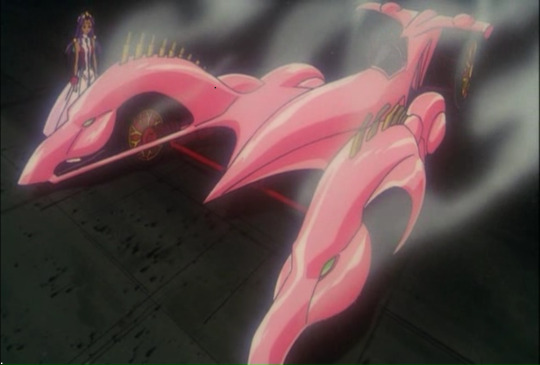
I think it is incumbent on the viewer at this point to try to unravel both why this makes sense as a gesture and why it seemed like a good idea at the time.
Point 1: It’s a magical girl transformation sequence. Ikuhara, having worked on Sailor Moon, knows all about this stuff. The beats of a transformation sequence are as follows: upon activation of an arcane device, a girl loses all her clothes and emerges clad in fetish gear. The ideal transformation sequence from a commercial perspective ends up with a girl wearing an outfit which appeals as much to young girls as it does to grown men. As has previously been established, grown men like cars – but this car is hot pink, shaped like a uterus and is trying as hard as it can to be a horse. Or two horses. It is a “car” in the same sense that Sailor Moon is a “high school girl”. It has been optimized to serve all of the needs of the academy at once.
Point 2: What we are dramatizing here is the fact that despite her avowed wish to leave the academy Utena has still been socialized in patriarchy and therefore cannot fully transcend her status as a player of the academy’s game. When she took Anthy’s hand and led her in the general direction of “out” she was still playing prince, saving the damsel in distress. This gesture does not work because the academy owns it. When she attempts it, she is revealed as what the academy forces her to be: an object. An exciting, ambiguously-gendered object, admittedly, an object which is absolutely up to date and this year’s model, but an object that is nonetheless made to please a particular audience. As long as Utena can still be the receptacle of male fantasy – as prince or princess – the story cannot work.
Point 3: Back in the old academy Anthy’s role in the final confrontation was to get stabbed a whole lot and lie in a coffin. Of course, something important and transformative did take place there, and the gesture that changed the academy did come from Anthy in the end; but she didn’t look cool doing it. Utena did all of the on-screen work. If Anthy is retelling the story here she wants to emphasize that despite all of Utena’s princely self-sacrifice the most difficult thing anyone did in that room was reach out of that coffin. She also wants to emphasize that she’s the top.
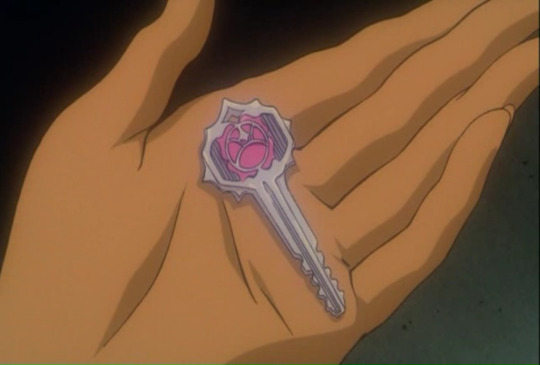
Akio killed himself earlier because he was unable to find his “key”. He lost it when he realized that Anthy was, if not enjoying herself, at least tacitly “consenting” to what he had been doing to her, which was, as far as he was concerned, not nearly as hot as the whole drugged princess routine. Anthy, however, already has Utena’s key. Get it? What we are emphasizing here, in case anyone got the wrong idea from the TV-mandated chasteness of the original series, is that queer desire is actually an integral part of the revolutionary moment. Anthy is able to go through with this because she really, sincerely wants to fuck Utena’s brains out.
So Utena’s sex car is saved from rusting away from disuse. The shadow puppet girls arrive to give Ikuhara’s old buddy Anno a shout-out and the race is on.
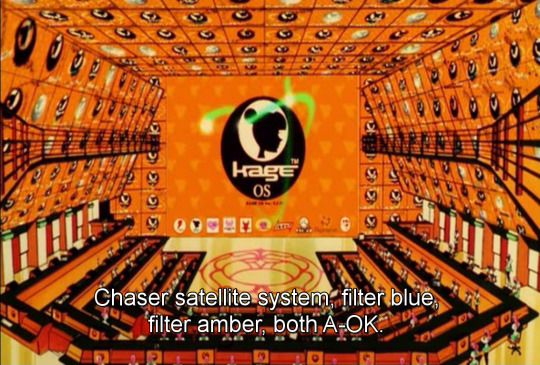
It’s worth considering whether there might have been a way to do the car metaphor without going full bananas zany with it – whether we might have found some kind of tonal harmony between Touga in the cabbage patch and Anthy in the driver’s seat. It would probably not have worked but I would have loved to see an attempt. As it is, the narrator has gone manic and we are flying, buddy, we are up in the clouds.
The shadow puppet girls (who apparently all have pink hair in this universe – emphasizing their artificiality, I suspect) complete their setup and a new challenger enters the race.
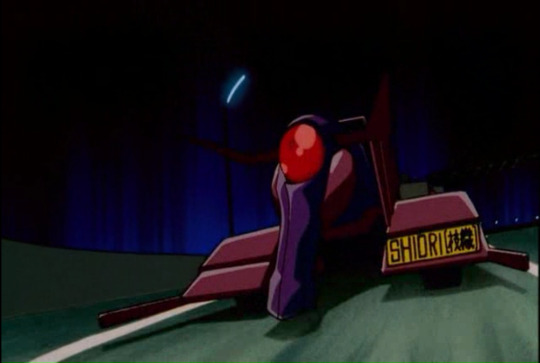
Shiori’s car looks kind of like Soundwave from Transformers. I always liked Soundwave. Her car is also considerably more phallic than Utena’s, having as it does a cycloptic bull for a figurehead. Shiori is acting as an agent of the academy here simply by making this a race, rather than an obstacle course - the idea that only one special person gets to leave the academy at a time plays right into the prince/princess narrative. It’s not a part of the story that Anthy particularly wants to dispel, either, which may be telling.
Shiori says the line of century, which I’m going to render literally for maximum effect: “It’s a big mistake to think that you were the only one who was able to turn into a car.”
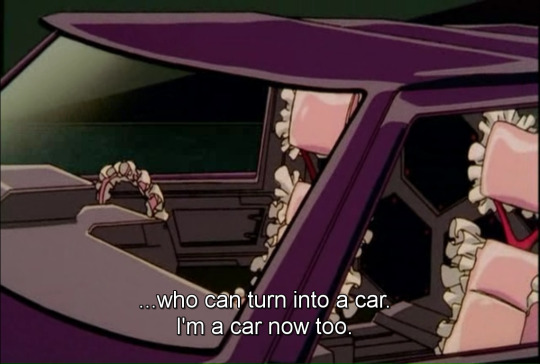
Behind the bull Shiori is a big ol’ Chrysler station wagon with frilly upholstery. She underscores the crabs in a bucket motif by saying that only she is cool enough to do something as neat as escaping the world before crashing into a retaining wall and exploding in a completely unforced error, which makes sense when you consider that nobody’s driving her.
Anthy has a nasty sense of humor.
Next up are the thousand drone tanks of the world’s resentment. The jokes are flying thick and fast now – the shadow puppet girls pick up the encroaching horde on a “vegetable scanner” which superimposes the danger on a picture of a salad, and the three filler dudes who were so fillery that I never mentioned them once in my recap of the original series show up with radar guns. The drone horde also makes a lot of really high-pitched honking sounds. The director wants us to know that he knows that this is stupid. The viewer may well ask what all that trauma from before was about, in that case, but there’s no time, the drones are attacking.
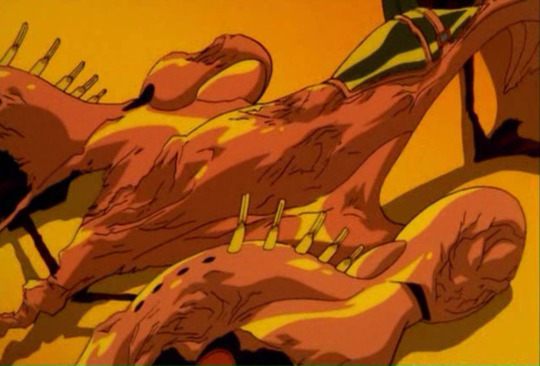
Utena’s chassis is effed up in much the same way that her uniform was back when she fought Touga that one time. Like the opening theme says: “what I want is to find my place in life and my self-worth, taking who I've been up until today and heroically stripping her down until she's bare, like the roses whirling in freedom.” Cast off that magical girl fetish gear, and be free! And nude. While we continue to film you. Trust us, it’s all very liberating.
Just as our heroes are about to be splatted by the biggest drone of them all, a tow hook shoots out from nowhere. It’s our heroes’ friends! Or… people who we can assume they made friends with, off screen, at some point!
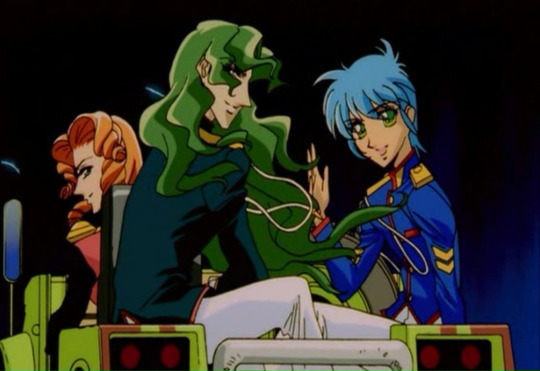
Ikuhara shouting in the distance: “Oh, the whole bandminton game thing was too subtle for you, huh? Need to have everything spelled out for you, huh? FINE”
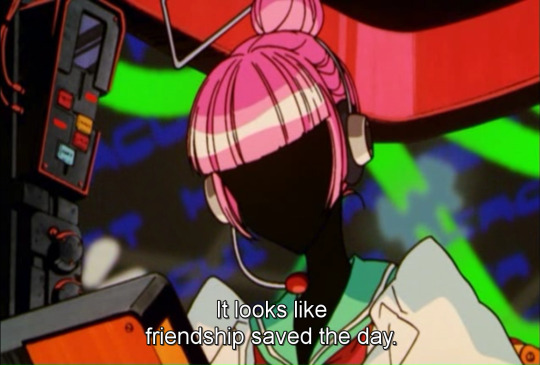
They are driving Wakaba, a Jeep. (The utility vehicle is truly the plain friend of the motorsports world.) Explaining their presence, Juri says that high ideals attract noble companions. (I like overtly conceited Juri, and wish her incarnation from the original academy had had a little bit more of that going on.) Miki tells Anthy that they will definitely follow her outside at some point. I do not believe him.
The final challenge approaches. It’s a giant Disney castle on wheels.
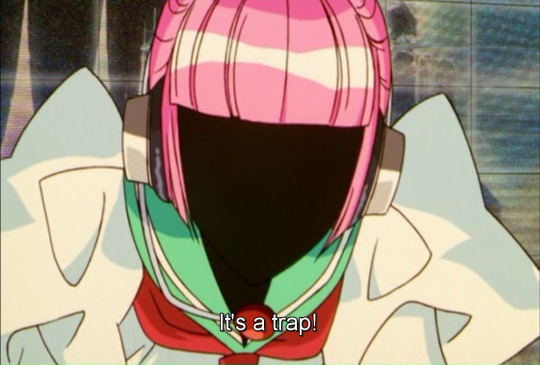
Thanks, Ikuhara. I am beginning to see a Point 4 emerging to complement points 1 through 3 above, straight from the director: “If I make this as shiny, noisy and overt as possible, maybe you idiots will pay attention this time.”
The castle hoves massively into the lane in front of them as somewhere in the distance the bongo player goes nuts. The shadow puppet girls implore Anthy to turn around and head back, but she’s not running anymore. Suddenly, the car is wearing a dress. Car Utena gets a secondary transformation - like, that wasn’t even her final form – like, you got your DBZ in my Sailor Moon, you got your Sailor Moon in my DBZ – like, we are now somehow even more uterus-shaped –
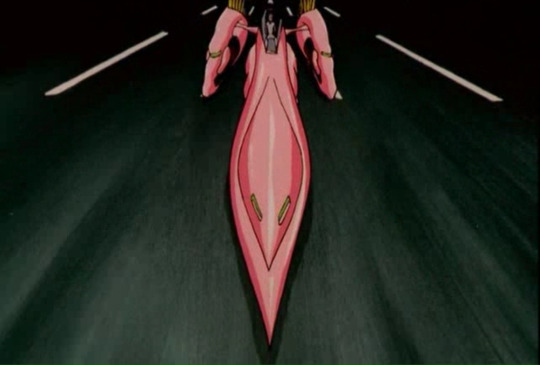
The extended dance mix of Rinbu Revolution starts playing, and let me just say that it is an incongruous choice for a car chase/demolition derby. Anthy makes it through the castle, to general rejoicing, but there remains one final obstacle.
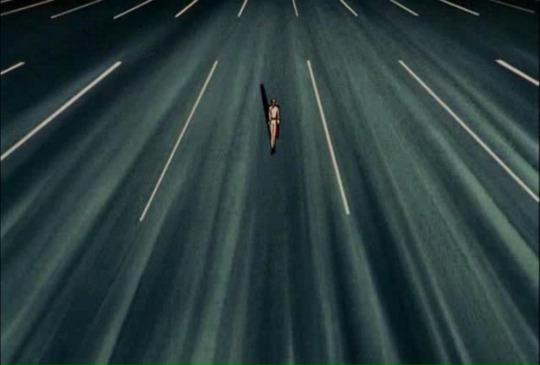
Point 5: to make all this masculine bullshit appear as silly as possible.
Akio tells Anthy that if she goes out there all she’s going to find is the end of the world. Which is true, of course – the point of the whole castle palaver, the point of all this fetishizing of youth and innocence, is to keep death at bay. If you can’t grow, you can’t die; but of course if you can’t grow, you can’t live, either.
Akio tells Anthy to go back to being a living corpse. (He can’t find his key, otherwise.) Anthy tells him to fuck off so he squeezes them between some giant tank treads.
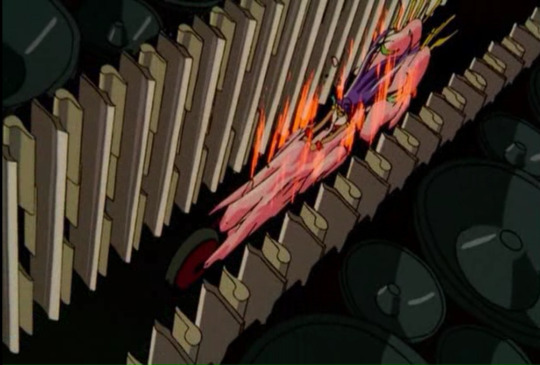
Utena there, getting denuded again, of course.
Then this happens.
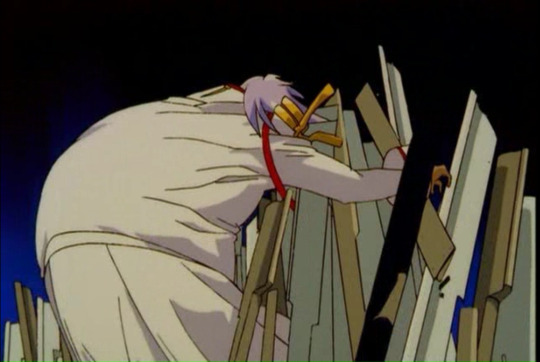
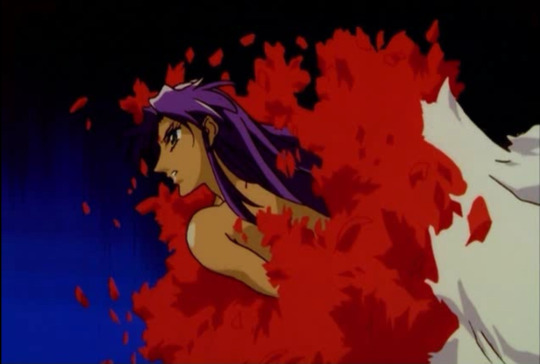
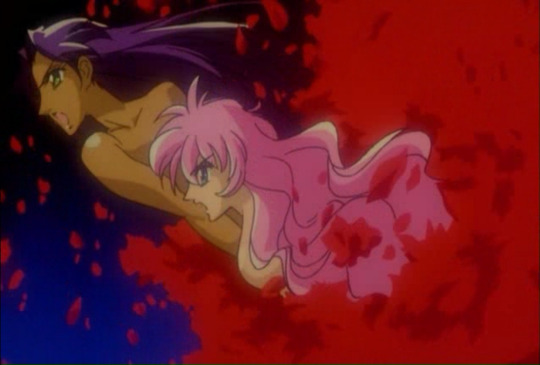
The prince is very, very dead. The castle collapses in a hail of rose petals and eurodisco. The shadow puppet girls lose their animating essence and become straw dolls named “Tenjou Utena” and “Himemiya Anthy.” Cause they were puppets the whole time, see?
“Real” Anthy and “Real” Utena chat about how there are no roads in the outside world and so they will have to make one themselves. They say this as they are literally driving on a road. Still on screen and still being filmed, the two girls recline naked on a speeding motorcycle and make out, as you do once you have been freed from the male gaze.
We end on a shot of another castle in the distance, which seems like a hopeful sign but should be the most ominous fucking thing in the world, if you’ve been paying attention.
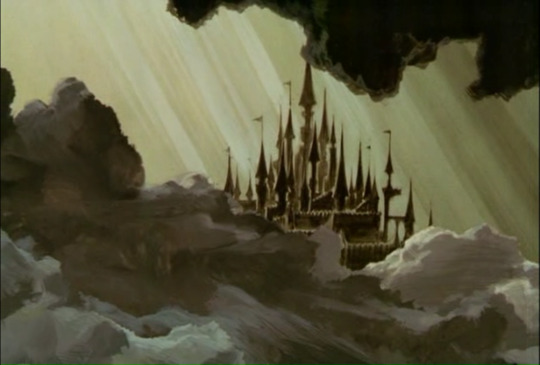
The only possible conclusion is that they have not actually escaped.
In the end I can only interpret the last act of this movie as a titanic shrugging of the shoulders, an admission of a failure to envision what escape from this milieu actually looks like. In this failure it invited other authors to take a crack at the same problem using the same kind of symbol language, which is how we got Madoka and its “let’s reframe choosing to be the Bride, who is still absolutely necessary to the functioning of the universe, as a revolutionary act in and of itself” thesis, among other things. Ikuhara has a lot to answer for.
The problem of course is that a genuine escape from the academy should probably not be written by someone who has a vested interest in the academy’s continued existence; and so I think if anyone does end up writing the Utena story with an ending that works, it won’t be Ikuhara, or, not to put too fine a point on it, dudes generally.
Then again it’s possible that outside the academy there are things besides writing and rewriting the same old story to worry about.
236 notes
·
View notes
Text
Episode 35. It's time for the puppet show!

Hmm.
Something about this feels a bit less whimsical than usual.
We recap last night’s revelations and establish that Utena still doesn't remember them. It's nagging at her now, though. Something about Anthy's face seems newly familiar.
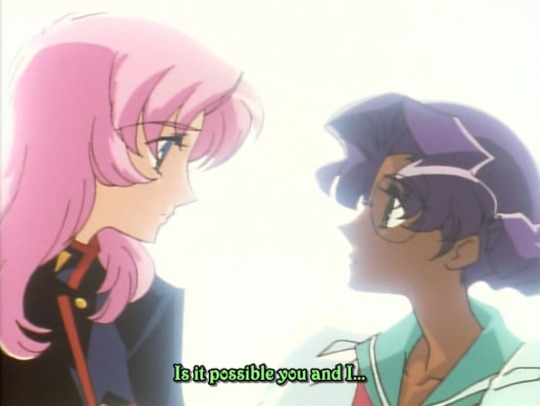
Thankfully, Akio's spidey sense tells him that character development is happening and he bursts in to break it up just in the nick of time.

(The subbers have rigged this entry in the Akio Unsubtlety Sweepstakes by translating "borrow" as "steal", just to make sure we all get the joke.)
There's kind of a greatest hits feeling about this segment - we get an encore of the Anthy's face hardening as they walk away routine, although she's less scary in this iteration and more 200% Done.

How many times has she seen this happen?
On their walk, Utena and Akio pass through the riotous fields of poppies that have totally always been here. Akio says it's a shame that friendship isn't the Eternal Thing. It would be great, he says,

Akio never gets around to explaining what poppies symbolize, but it's sleep, death, dreams, remembrance. Narcotics and narcosis. If he had gotten into it, it might have been a bigger giveaway even than the Lucifer thing. Questions arise: what does being suddenly stuck in the middle of an enormous labyrinth of poppies represent? And what does the car represent? And, more importantly -

Touga wants to know exactly what Akio is doing with/to Utena - purely in a professional capacity, of course.
It is difficult to decide which individual frame best sums up the ensuing conversation.

If I go with this one, for example, you lose the fact that Akio is lying on top of a car, which is perched on a dais, which is itself balanced on an enormous pyramid of additional, identical cars.
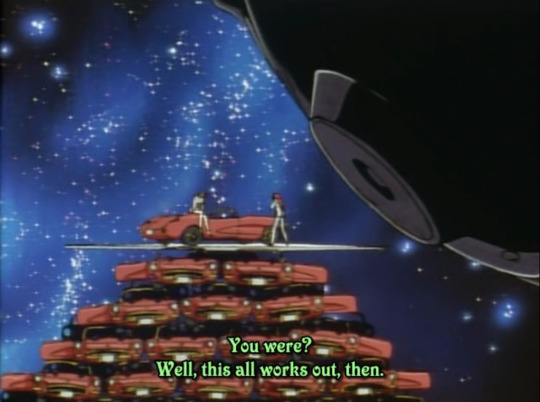
Then again, if I go with this one, you lose the sense that Akio is about to caress his own nipple. Which he does.
Regardless, Touga says he's planning to shake Utena up a little before their duel, as per usual. Akio tells Touga to bring her a present for him. He says it can be anything - he's confident that Touga, a natural playboy, will choose just the right gift. Touga says that Utena doesn't go for gifts, on the evidence of her having rejected that dress he bought her back in Episode 3. Akio points out that her most treasured possession is a ring that some strange dude gave her years ago.
Touga has the look of a man who knows that he is about to be owned very badly, but the casual villainous bonhomie he's got going with Akio prevents him from objecting. He can't look uncool in front of his mentor, so, full speed ahead.
Touga duly delivers a pair of earrings to Utena. She is thrilled to see that Akio has gotten her a present but is not sure if she can accept. Wakaba, the filthy traitor, is having none of that.
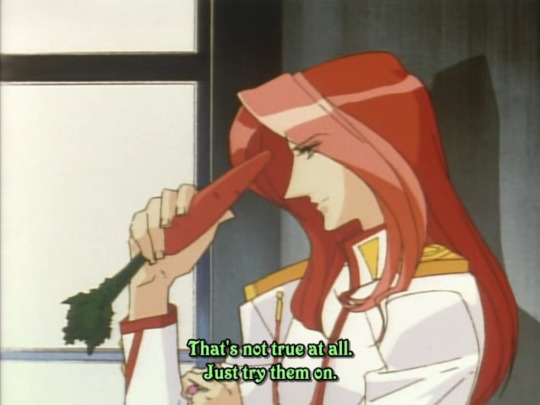
...
So, we come now to a question that I've been dreading ever since I started this project, which is "why does Touga have a carrot."
On one level he has it because he is about to go ride a horse. Horses eat carrots.
On another - yes, it’s yet another dick. He's trying to be like big brother Akio and drench himself in sexual symbolism, but he can't afford a big red car, and he doesn't have a driver's license. He can afford a carrot.
But the main reason he has it is for this shot:

Because... I'm sorry, the last five years of political discourse have made this more unpleasant than it needs to be, but, y'know... horns. Sign of a cuckold and all that.
He has the carrot because he's a big steaming cuck.
Despite this, he successfully whisks Utena off to his next, upgraded penis symbol, which is A Horse. He is badly off his game, here - cross-examining her about princes and horses when he hasn't even bothered to check out a white one from the... horse library... or however this works.
Also whatever point he was trying to make is diluted somewhat when the resolutely not-white horse hops over a tree root and Utena flies the fuck off.

Then this happens.
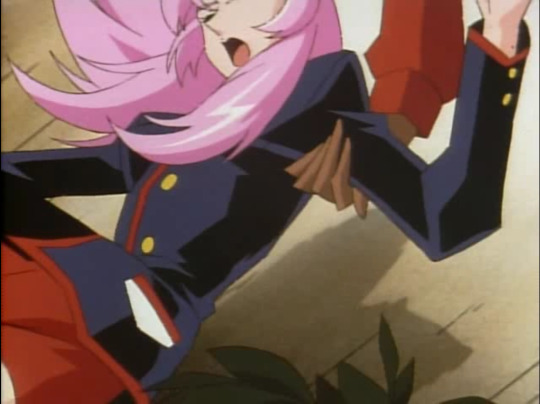
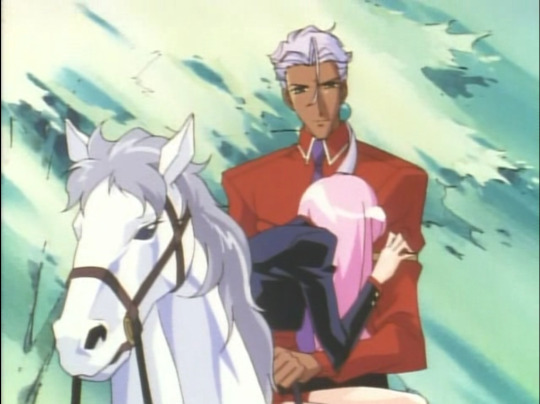
Akio's is bigger.
(He also has, like, impossible upper body strength, but that's neither here nor there.)

"I don't know what I was expecting"
So, the worm has turned, the rattler become the rattled. The sight of Utena gazing adoringly up into Akio's face has put him in such a mood that he can barely be bothered to knock off his daily middle-schooler. He's sick of being a 'playboy' - particularly now that he's getting his head handed to him by a playman, and let me just apologize immediately for that
Even Saionji can tell that something's up.
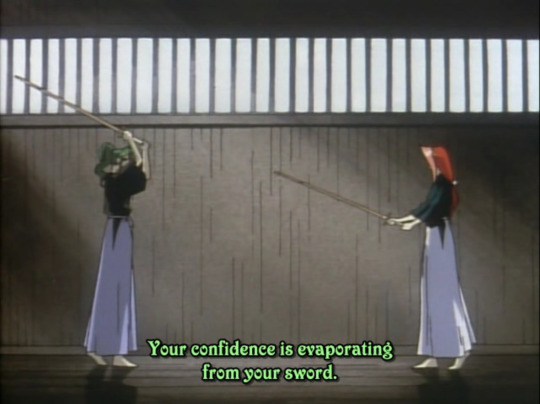
So what's the cause of Touga's sudden deflation? Why can't he perform? The shadow puppet girls have a theory, which they deliver via an elaborate fishing metaphor. The super cool nice-guy playboy fisherman can catch any kind of fish except one:
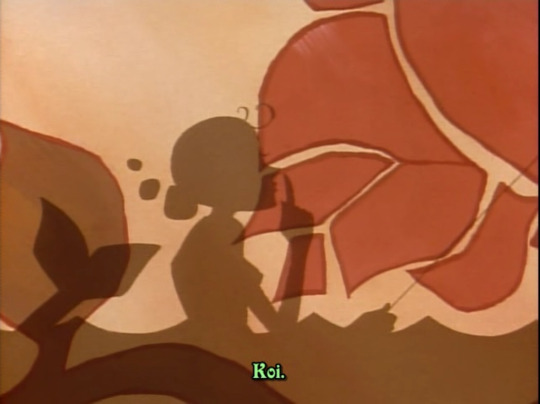
Which also means "love" in Japanese. Thus the joke.
Later, Utena is lost in a reverie. She can't stop thinking about how Akio let her touch his horse.

Similar equine double-entendres follow. Utena can't quite believe that her prince actually showed up on a white horse - her bullshit detector is sitll in there somewhere, under all the gunk - but she's lost enough that she falls asleep holding the gift he gave her. Anthy finds her there and has a face about it.

Akio tells Touga that he lost the game. This is clear anyway - Akio has many cactuses, and Touga only has one. Akio tells Touga that he thinks Utena should be:

Touga isn't sure.
I really shouldn’t have to tell you what the cacti represent at this point.
Touga and Saionji head up to the balcony for the last meeting of the student council before the End of the World. It's just the two of them. Saionji has now been through the wringer enough that he's graduated from fool to wise fool, just like Nanami - it's the folks who were ground down the most by the game who have the clearest view of it. Touga says that he... might?... genuinely love Utena, and that he wants to save her from Akio by beating her in the duel. (When all you have is a hammer, etc.) Touga wants the power that got Utena out of that coffin, but Saionji points out that she's still in that coffin, isn't she? Or she wouldn’t need saving. They're all still in their coffins, come to think of it. The miraculous power that Akio has isn't as miraculous as it's cracked up to be.
It's a crucial conversation and in order to make sure we pay attention to it the camera throws in a phantasmagorical press conference, rampant shirtlessness, a completely superfluous visual pun about tea, the most egregiously phallic shot of the chairman's residence to date and Touga touching his own invisible anime nipple. I feel that in trying to capture it via screenshot I would only be doing it a disservice - I will only say that I love that these boys take off their shirts to discuss feelings.
Meanwhile, Utena and Anthy are out in a field together, in their usual idyllic fashion, except Utena is preoccupied with Akio’s present. Then she looks up at Anthy and sees

The feeling of having forgotten something important - the thing that, if remembered, would reframe your history entirely, tap your life's context just a little bit so that it settles for the first time into something comprehensible - there’s excitement and dread in that feeling. The possibility that there is a key to understanding yourself, coupled with the possibility that you will never find that key, and will continue to make the choices that a lost person makes until you have made so many mistakes that you can no longer find your way back to your truth.
Nothing as terrifying as a glimpse of the real after a long sojourn in fairyland.
#utena#utena liveblog#next time: will touga win his duel???#and if you said yes I've got a bridge you might be interested in
105 notes
·
View notes